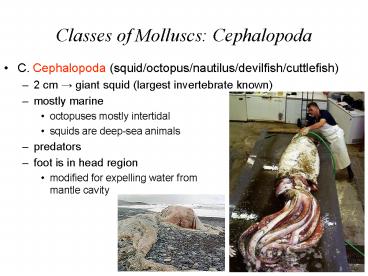Classes of Molluscs: Cephalopoda - PowerPoint PPT Presentation
1 / 11
Title:
Classes of Molluscs: Cephalopoda
Description:
foot is in head region. modified for expelling water from mantle cavity ... accessory/branchial at base of each gill pressure. Classes of Molluscs: Cephalopoda ... – PowerPoint PPT presentation
Number of Views:441
Avg rating:3.0/5.0
Title: Classes of Molluscs: Cephalopoda
1
Classes of Molluscs Cephalopoda
- C. Cephalopoda (squid/octopus/nautilus/devilfish/c
uttlefish) - 2 cm ? giant squid (largest invertebrate known)
- mostly marine
- octopuses mostly intertidal
- squids are deep-sea animals
- predators
- foot is in head region
- modified for expelling water from
mantle cavity
2
Classes of Molluscs Cephalopoda
- Major groups of cephalopods
- 3 subclasses of cephalopods
- Nautiloidea - 2 pairs of gills
- Ammonoidea - extinct
- Coleoidea - 1 pair of gills
- Nautilus only surviving genus in Nautiloidea that
populated Paleozoic seas - 5-6 living species
- head w/ 6090 tentacles that extend from opening
of shell - tentacles lack suckers, have adhesive secretions
- 4 O. of Coleoidea include all living cephalopods
except Nautilus - O. Sepioidea - cuttlefishes w/ round body, 8
arms, 2 tentacles - O. Myopsida and Oegopsida - squids w/ more
cylindrical body, 8 arms, 2 tentacles - O. Vampyromorpha - 1 sp. of deepwater vampire
squid - O. Octopoda - 8 arms, 0 tentacles
3
Classes of Molluscs Cephalopoda
- Shell
- gas chambers in nautiloid and ammonoid shells
allow swimming - bouyancy
- nautilus shell divided into chambers
- living animal only inhabits the last chamber
- cord of tissue (siphuncle) connects chambers to
visceral mass - gas pressure in nautilus chambers 1 atm
- 41 atm in deep ocean
4
Classes of Molluscs Cephalopoda
- cuttlefish shell enclosed in mantle
- squid shell is thin strip enclosed in mantle
(pen) - octopus has completely lost shell
5
Classes of Molluscs Cephalopoda
- Locomotion
- swim by forcefully expelling water via ventral
funnel/siphon - octopuses crawl on bottom/swim backward by
spurting water jets - webbing btwn arms allows swimming w/ medusa-like
action - control direction/force of water
- determines speed
- lateral fins of squids/cuttlefishes stabilize
- Active life of cephalopods
reflected in
respiratory/
circulatory/nervous systems
6
Classes of Molluscs Cephalopoda
- Respiration/circulation
- 1 pair of gills
- 2 pair in Nautilus
- muscular pumping keeps water flowing through
mantle cavity when ? O2 demand - network of vessels conducting blood through gill
filaments - blood goes to
systemic
circulation
before gills - accessory/branchial
? at
base of each
gill ?
pressure
7
Classes of Molluscs Cephalopoda
- Nervous/sensory systems
- largest brain of any invertebrate
- giant nerve fibers
- well-developed sense organs
- complex eyes (cornea/lens/retina)
- learn by reward/punishment/ observation of others
- lack hearing
- tactile/chemoreceptor cells in arms
8
Classes of Molluscs Cephalopoda
- Communication
- chemical/visual signals
- cells in skin contain pigment granules
(chromatophores) - contractions of muscle fibers attached to cell
boundary cause cell to expand and change color
pattern - deep-water cephalopods have luminescent organs
- ink sac empties into rectum
- ink gland secretes sepia
when
animal is alarmed
9
Classes of Molluscs Cephalopoda
- Reproduction
- dioecious
- ? seminal vesicle
- spermatozoa packaged in spermatophores and stored
- 1 arm of ? modified as intermittent organ
(hectocotylus) - plucks spermatophore from mantle cavity and
inserts it into ? - fertilized eggs leave oviduct, attach to
substrate - large, yolky eggs
- hatch into juveniles w/ no free-swimming
larval stage
10
(No Transcript)
11
(No Transcript)































